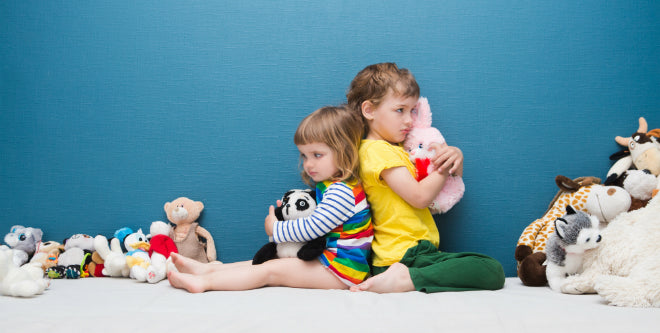" Tips on the right parenting method "
Parents have to teach their children many things before they gradually become young adults. Learning to share is also part of this and is a very important part of a child's social-emotional development. This task is particularly challenging for young children. But with a lot of patience, love, consistency and helpful advice, this time will pass sooner or later.
The child in its own world
Until children are three years old on average, they go through numerous spurts and leaps in their development at a rapid pace. This also includes the discovery of their own ego and the will that goes with it. This means that their own personality is directly linked to the objects in their possession. The loss of a toy can therefore quickly mean a loss of personality. The little one cannot yet understand that giving or sharing is something positive and can also bring joy. First and foremost, learning to share means giving up things that belong to them and that are no longer available for their own unrestricted use. The best way for parents and caregivers to help is not to force their offspring to do anything and to show patience and understanding for the situation. After all, it is actually a step forward when children realize that they own things and that they can go away. To avoid provoking fear of loss, it is also important that the little one wants to give things away of their own accord and acts voluntarily.

Children playing and sharing with each other
Do children need to learn to share?
There are now many studies on this topic, including whether and when children can learn to share. But the real question is whether our children need to learn it at all. Many parents believe that their children should be brought up to be social and empathetic. This includes being open to other children and new situations and also voluntarily giving away toys. However, it is particularly upsetting for the little ones when their favorite toy or the best book suddenly has to change hands temporarily. For siblings at home, the child who is to give toys to a sibling can be asked which toys they are willing to give away. They will often opt for things that belong to them but are not so popular at the moment. They will be happy to do so, especially on their own initiative, toys with the sibling or give it to them. Limits should be set here to ensure that sharing toys is not compulsory and that it is respected if they do not want to share. After all, we adults don't want our property to be controlled by someone else either. Therefore, this should not be expected of our own offspring either.

Children fighting over a toy
Reward is not the key to success
Of course, parents can use motivation and positive reinforcement to accompany new situations in the child's everyday life. However, as soon as rewards are used in any form, it is very difficult to stop the desire for them at a later point in time. If the reward does not materialize later or is delayed, the willingness to share quickly disappears again. This is therefore not a method that promises long-term success. It is better if the little ones realize that their patronizing behaviour has a positive effect on the other person. As this is a long learning process, no great success should be expected in the short term. Constant motivation and praise are a very good way of talking to your offspring. This makes the little ones proud and gives them an additional reason to continue thinking about their behavior and repeat it.

Rewarding or scolding is the wrong approach
Be a role model yourself
Learning often takes place through imitation of the immediate environment. First and foremost, these are the parents and close caregivers. In parenting, it is very difficult to expect something from your offspring and to teach them rules that you yourself do not exemplify and actively implement. This can also be applied to the topic of sharing. If dad is not prepared to give his son his food, he will not come up with the idea of giving his own dish to someone else. He simply won't see the need to do so and may even develop a kind of food envy towards other children. So here too, as in all matters of parenting, it is important to be as authentic as possible and actively model the desired behavior.

Parents must be a role model
Games on the subject of "sharing"
If two children argue because they want a certain toy at the same time, various games can help to improve mutual understanding. For example, if you are in a playgroup or occasionally meet up with several mothers, you can take a plate of cookies or fruit and a color cube with you next time. If a predetermined number or color is rolled, a child can take a cookie or piece of fruit and choose another participant to share it with. This is particularly fun if the adults encourage them to do it with someone they don't usually play with. Or a girl has to team up with a boy if that works for the group. Children can easily learn through these and other games. And it's fun and voluntary, because it's simply part of the game.










